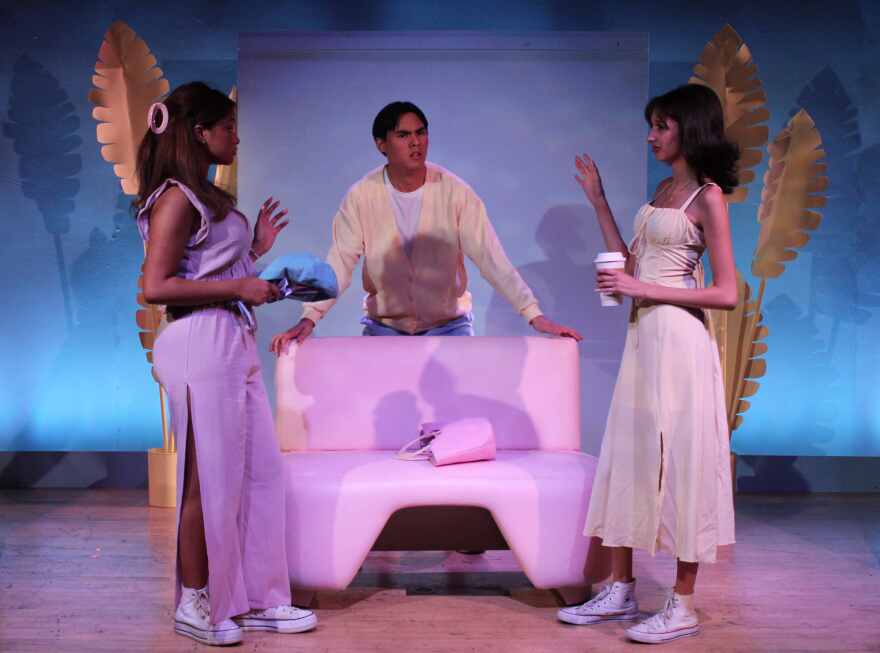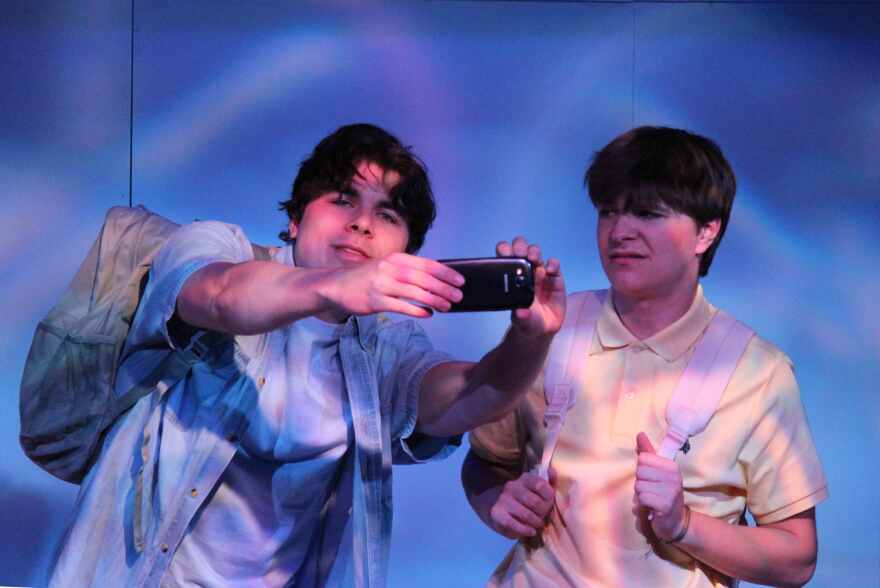Stuart Brown heads Florida Southwestern State College's theater program. A few months ago, he asked Miami playwright Samara Siskind to write a 10-minute play that pays tribute to modern artist Robert Rauschenberg.
"I immediately started looking at his work and I came across a photo of the sculpture called 'Riding Bikes' in Berlin, Germany," said Siskind.

Rauschenberg is synonymous with collaboration. In that vein, Siskind brainstormed with Brown's theater students on a storyline for the play.
"I sent the image to Stuart and with his students, we looked at it and I asked them for their initial responses, like what they thought this meant to them and through their answers that helped me shape the play, shape the story," Siskind explained.
Theater student IsaBella Fernanda Ginart was part of that process.

"We kind of all spitballed what we felt the piece meant and how we personally interpreted it, and she just took that and ran with it and gave us a really awesome play," Ginart noted.
Siskind says that everyone benefits from a collaborative creative process.
"So in this play, 'Riding Bikes,' I focused on two cousins and was able to explore a dynamic that I had never attempted to write about," Siskind added. "So it was a learning process for me as well."

Theater student Delilah Mendez is honored to be part of the creative team.
"We were all pleased because, like wow, this is pretty much what we had in mind and she delivered," said Mendez. "So it definitely was an experience. I've never been part of that before. It was her writing, but we helped with that."
"Riding Bikes" continues Nov. 15 and Nov. 20-22 at 7 p.m. in the FSW Rush Auditorium (J-103) on the FSW Lee Campus, 8099 College Parkway, Fort Myers.

MORE INFORMATION:
While "Riding Bikes" is the headliner, the evening of performances actually consists of seven 10-minute plays.
'Stuart [Brown] actually read a number of my plays on New Play Exchange and chose six of them," said Siskind. "The seventh is the one that was commissioned directly by FSW. So this will be a world premiere of that particular play, which is so exciting."
The Other Six
"These six plays feature young people either high school, college-age or in their 20s or early 30s," Siskind pointed out. "I thought all of these plays would be ideal for the students at FSW to perform."

The first play on the program is titled "But, Babe." It features FSW theater students Tomas Jaramillo and Delilah Mendez.
"In that play, a Cuban college boy brings his very un-Hispanic girlfriend home to meet his parents the night before Christmas, and chaos ensues," Mendez said.
Among other cultural clashes, the girl is vegan, and the boy celebrates Christmas by roasting a pig over an open pit.

"Then there's 'Kevin and Jules.' In that play, two high school kids are navigating their way through a game of Seven Minutes in Heaven, so it takes place in a closet in real time."
"Kevin and Jules" features Liam Tritalk and Lia Jaquez.

"The next play is 'Tiny Man on Ferry,' which is another meet-cute two-hander, but instead of the boy and girl meeting at a park, they meet on a ferry," Siskind noted.
It starts with him trying to get a selfie with an extendable selfie stick while hanging over the side of the ferry. She thinks he's suicidal and yanks him back over the rail. She is Delilah Mendez. William Urban plays the boy.

"'Put Your Hands on Me, Brett' is a play that follows a young married couple who are parents. They're basically trying to spice up their sex life," Siskind continued.
They're actually role playing, but he's having a difficult time getting out of his head, much to his wife's frustration and chagrin. IsaBella Dinart and Ian Buttion play the couple in this play.
Following a 15-minute intermission, the evening resumes with "Twinship."

"That's the only drama in the bunch, and it deals with twin sisters who reconnect at their old home on Thanksgiving Day," said Siskind.
"Twinship" is the most sophisticated of the seven 10-minute plays, and Siskind leaves room for the audience to use their imagination about the reason the fraternal twins lost touch. Although there's plenty of foreshadowing, the ending comes as something of a surprise. Enough said, except that Lia Jaquez and Rafaella Pazmino are exceptional as the twins.

The last of the "other six" is "Missed Disconnections." The title takes its name from the dating app "Connections," which is how the characters in this play meet.
"A lot of my plays are kind of like meet-cutes," Siskind noted. "So in this one, there's a boy and girl who meet at the park. Things are thwarted when his other match shows up a day early for her date."
Ian Buttion plays the boy, and he gives off a definite Bowen Yang ("Saturday Night Live") vibe. He's sandwiched between Delilah Mendez and Lia Jaquez.

"Riding Bikes," is performed next to last on the program.
The play references incidents from early in the artist's life, including his relationship with Jasper Johns. Liam Tritaik and William Urban star in the play.
More on 'Riding Bikes'
Siskind more than appreciated the opportunity to write a new play for FSW and Stuart Brown. She relished the chance to become part of the Robert Rauschenberg centenary celebration.
"Stuart had the idea of collaborating on a new piece together and I was all in," Siskind said. "He informed me that FSW had this wonderful relationship with the artist, Robert Rauschenberg, who premiered much of his work at the gallery on campus that was named after him. So, this year marking his 100th birthday seemed like a wonderful opportunity to celebrate him and honor his legacy."
Siskind was familiar with Rauschenberg prior to being commissioned to write a play for his centenary.
"I knew that he was an influential modern artist of the 20th century, and I knew that he worked with found objects and liked to incorporate everyday objects into his art. I always found that very fascinating," Siskind said. "So yeah, I was familiar with his work, but I did enjoy learning more and seeing more of his work."

Siskind didn't involve Brown's theater students as a tribute to Rauschenberg's proclivity for collaboration. She collaborates as a matter of her own playwriting practice.
"When I'm writing for this particular age group, I really like to hear their ideas and the way they're seeing the world right now," Siskind noted. "Their comments inform me on what kind of characters they see and what kind of stories they're interested in."
The students' input steered Siskind in an unfamiliar direction.
"As I mentioned before, a lot of my plays are meet-cutes and they deal with themes of love and connection in some way, whether it be first love or marital love or familial love, or even the hope to find love," Siskind said. "So I noticed that all of these pieces that Stuart had picked, except for the one with the two sisters, was like a male-female romantic kind of relationship. So in this play, 'Riding Bikes,' I focused on two male cousins who take like a last bro trip together to Berlin, where they see the sculpture, the actual 'Riding Bikes' sculpture, and it helps bring them closer together by bringing up moments from their childhood and their relationship."

Writing Dialogue for Young Characters and The Actors Who Play Them
"When writing about young characters, I try to write in the way they speak, but then every time I have a first reading of the play, I'm always asking them to check me so if there's any terminology that I'm using that is outdated or that you just don't use or don't say, please let me know. So working with the young people who the plays are based on helps a lot."
Siskind appreciates the candid responses she typically gets. There have been some occasions where changes are not recommended. But that's the exception.
"They let me know, oh, we're saying this now because their lingo is constantly changing, right?"
Siskind also avoids the temptation to include pop culture references in her plays.
"I used to a lot more in my earlier work, but then I realized I didn't like to date my work," Siskind observed. "I like my pieces to be kind of timeless. So, if I do list any pop culture references, I'll include a playwright note saying that basically this can be changed and updated at any time to keep the references current."

The Growing Appeal of the 10-Minute Play
"I gravitate towards writing 10-minute plays just because it's much easier for me as a mom with two little kids," Siskind noted. "I mainly write in between, like in the morning hours after I drop my kids off at school and before I go and pick them up in the afternoon. So I have a small window of time where I'm able to write. And I just have a knack for coming up with the conflict and the situations and wrapping it up really quickly."
There is also a considerable interest in that format at the moment.
"There's a lot of people who call it short attention span theater and there are a lot of 10-minute play festivals where the big draw is if you don't like this play, then just wait a few moments and there'll be another one."
It's also one of the reasons that people like attending fringe festivals, where shows run around 50 to 55 minutes.
"Every time I've gone to see a 10-minute play festival, there's always at least one, usually more plays that are very relatable to me and what I'm dealing with at that particular time," Siskind added.

More on the Playwright
Samara Siskind is an award-winning playwright based in South Florida. Her plays have been produced nationally and internationally in eight countries. Her work is published and licensed by Playscripts, Brooklyn Publishers, and Next Stage Press, as well as featured in "The Best Ten-Minute Plays of 2023," "The Best Ten-Minute Plays of 2024," "The Best Women's and Men's Stage Monologues of 2024," and "The Best Women's and Men's Stage Monologues of 2025," soon to be released by Smith & Kraus. She is the resident dramaturg for Athena Project and a graduate of Webster University's Conservatory of Theatre Arts. www.samarasiskind.com.
She met Stuart Brown during Florida Repertory Theatre's PlayLab in May.
"I was fortunate enough to have one of my full-length plays included in Florida Repertory Theater's PlayLab of new works," Siskind explained. "I came to Fort Myers and was assigned a cast and a director, and that director was Stuart Brown. He was just amazing and he did such a wonderful job with my play, and we developed a friendship. At some point he said, 'oh, you know, we should work together again,' and I was like, 'that would be my dream.'"
Support for WGCU's arts & culture reporting comes from the Estate of Myra Janco Daniels, the Charles M. and Joan R. Taylor Foundation, and Naomi Bloom in loving memory of her husband, Ron Wallace.
Copyright 2025 WGCU



